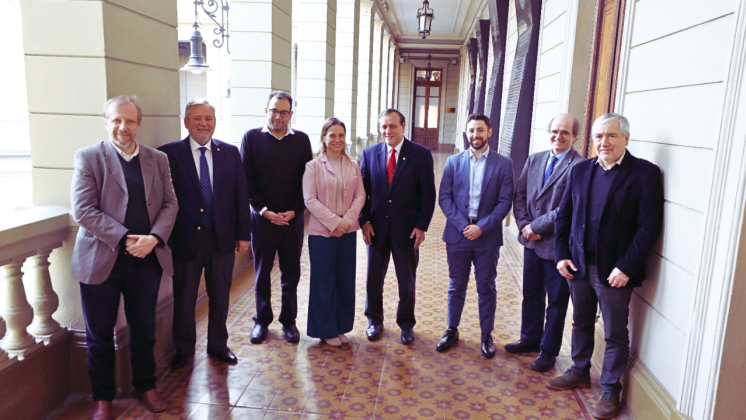CLEAR-LAC Begins Operations at Universidad Católica in Chile

Following the signing of an agreement between the World Bank and the Universidad Católica in Santiago, Chile, the Center for Learning on Evaluation and Results for Latin America and the Caribbean (CLEAR-LAC) began operations in July 2024.
CLEAR-LAC—part of a global network of CLEAR Centers, supported by the World Bank and the United Nations Development Programme through the Global Evaluation Initiative—works to strengthen monitoring and evaluation (M&E) systems and foster evidence-based decision-making in the region. The Center in Chile, supported by the UC Public Policy Center, the Abdul Latif Jameel Poverty Action Lab in Latin America and the Caribbean (J-PAL LAC), and the Centro de Medición (MIDE UC), commemorated the start of operations with a meeting.
The Board of Directors, represented by Ignacio Irarrázaval, Director of the UC Public Policy Center; Francisco Gallego, Scientific Director of J-PAL LAC; Jorge Manzi, Director of MIDE UC, and representatives from the World Bank in Chile, Rossana Luco, Head of Communications, and Jaroslav Brejcha, Operations Analyst, met with Ignacio Sanchez, President of the Universidad Católica, and Patricio Donoso, Provost of Institutional Management.
Mr. Sanchez thanked the World Bank for supporting the initiative. “Everything related to measuring public policy intervention is very important at a national and regional level,” he said. “Here, there is experience in the subject, in different areas, so I believe that we are taking firm and sure steps in this project. What can be generated here is very useful for the countries, for society, for the people, since being able to monitor well, evaluate well, and propose more solid public policies is part of the task.”
The World Bank representatives expressed gratitude for this new link with the university and supporting organizations. “The objective of the World Bank office in Chile is to develop innovative things in the country that can be replicated in other countries,” said Ms. Lucco. “What you are doing and will continue to do here with CLEAR-LAC is very much aligned with that.”
Cristian Crespo, Executive Director of CLEAR-LAC, presented the work agenda and objectives of the initiative, which include strengthening country M&E systems in Guatemala, Ecuador and the Dominican Republic, capacity building through courses and workshops, and fostering a culture of evaluation and knowledge sharing in the region by promoting communities of practice, organizing seminars and facilitating gLOCAL Evaluation Week.
Mr. Gallego, from J-PAL LAC, remarked on the regional objectives of the initiative. “Much of the evaluation, of learning in public policies, is played in the last mile, in that governments have M&E capabilities to be counterparts, to ask questions, to have a logic of evaluation as a learning tool, to do things better, so we are very happy to be part of this initiative.”
Mr. Irarrázaval, from the UC Public Policy Center, talked about the need to look beyond evaluation results. “Our concern is also in line with knowing what happens with the evaluations,” he said. “For example, if a program is badly evaluated, does it have budgetary implications or not? We are also very happy to contribute to the political view of public policies.”
Jorge Manzi, of MIDE UC, highlighted the collaboration between the three institutions that support CLEAR-LAC at the university. “This is not simply an association of centers,” he said. “But rather the creation of a new entity that has a pretension of projection and where the hallmarks of the University converge.”
CLEAR-LAC works to develop partnerships with governments, regional and international organizations, civil society and the private sector. It facilitates academic contributions by collaborating with specialized centers focused on generating evidence. Although CLEAR-LAC is already operating in the region, the initiative will officially launch at the end of 2024.